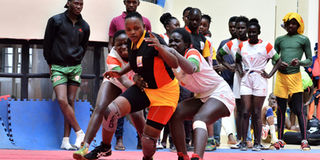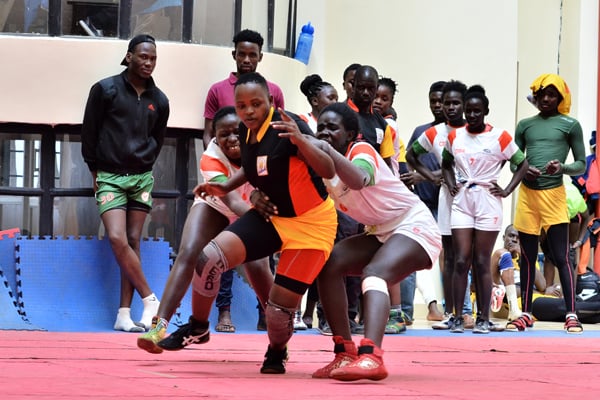Uganda’s Kabaddi pays homage to motherland India

Big winners. Olivia Nalubega (L) is restrained from scoring a raid point by a Kenyan player during the World Cup qualifiers. PHOTO/George Katongole
What you need to know:
- Although Kabaddi has a World Cup and is played in the Asian Games, it does not have an international presence. There are only 17 countries that have been given ranks based on points accumulated in tournaments.
India is the heart and soul of Kabaddi. For decades, the sport, a mix of wrestling and tag, has been the pastime of the people in South Asia, especially India, Bangladesh and Pakistan.
For the first time, Uganda was part of the 10th edition of the Just Kabaddi League (JKL) in Haryana Yoddha, India.
Uganda did not field a men’s national team; rather, the eight individuals were scattered among participating teams. National captain Joel Machari and Jimmy Ssengendo ended up with gold medals after appearing for Bangalore Tigers, the champions.
The women’s team, which played as Team Uganda, were losing finalists against Hyderabad.
But Uganda has already stamped its authority on the sport, especially after a good showing in the World Cup qualifiers despite poor preparations.
Novices
Unlike the established players from Indian teams, Uganda is a ragtag unit of novices, part-timers, and transplants from other sports. The Ugandan contingent at JKL was comprised students mainly from Mulusa Academy. Others are former football players, and a chef.
But their showing was highly applauded by JKL chief executive Sohan Tusir, and it is clear that Uganda kabaddi’s revolution from dusty pastime in Matugga to the international stage is well underway, and that the Uganda team will not remain anonymous for long.
“The national team will now be stronger. We’re counting on the experience gained,” Edgar Mujuni, general secretary of Uganda Kabaddi Federation, said.
Although the Uganda team is bustling with character, its members are lacking in experience. The Indian players were far too strong.
Lesson learned
“There are technical aspects we can build on, especially that we’ll play in the World Cup next year. This was a good learning curve for the team,” Mujuni added.
While some members could still be aggrieved at their exclusion, the makeup of the national team at the JKL presents a new face for kabaddi as one with a greater potential to tap into the youths.
The JKL is in a league of its own even though it is below the money-spinning Pro Kabaddi League. Brimming with ambition and potential, local kabaddi officials are looking to establish a strong league after the success of the JKL.
“Before the lockdown, we had plans for a pro league but we now have more motivation,” national team coach Ephraim Makubuya said.
Kabaddi presents a unique situation as the Indian-backed companies have rallied to help the national team since 2018. And although they did not win as a unit, one thing that is for sure is that the world is finally watching.
[email protected]




